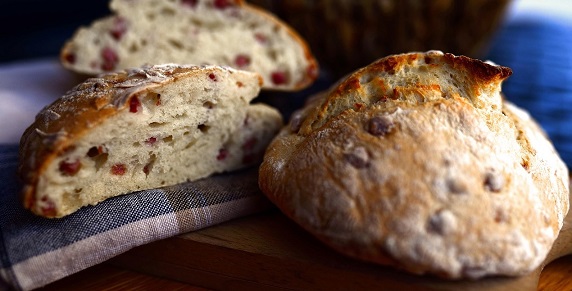
Fragrant, rich, and naturally sweet Früchtebrot or German Fruit Bread is a festive loaf filled with dried fruits, nuts, and spices. Traditionally enjoyed during the Christmas season and throughout Advent, this dense bread is a delicious slice of Germany’s holiday baking heritage.
Perfect as a seasonal gift or for serving alongside tea or Glühwein, Früchtebrot combines nourishment with indulgence and nostalgia.
The Origins of Früchtebrot
Früchtebrot dates back to medieval times when dried fruits were a precious commodity. German bakers used them to create richly flavored loaves for feast days and religious observances. Particularly popular in southern Germany and Austria, this bread was often shared among friends and family as a symbol of good fortune.
Unlike sugary fruitcakes, Früchtebrot relies on natural sweetness from figs, prunes, and raisins – often soaked in juice or rum for extra depth.
Love seasonal bakes? Check out Stollen – German Christmas Bread and Lebkuchen – Traditional German Gingerbread.
Ingredients & Preparation (Step-by-Step Recipe Guide)
Ingredients for Authentic Früchtebrot Recipe
- 250 g (2 cups) rye or spelt flour
- 100 g (1 cup) chopped dried figs
- 100 g (1 cup) chopped dried prunes
- 100 g (¾ cup) raisins or currants
- 75 g (½ cup) chopped hazelnuts or walnuts
- 50 g (¼ cup) dried apples or pears (optional)
- 1 tsp cinnamon
- ½ tsp ground cloves
- 1 tsp baking soda
- 200 ml (¾ cup) apple juice or black tea
- 2 tbsp honey or molasses
- 1 tbsp apple cider vinegar
Optional tools: Mixing bowl, loaf pan, parchment paper, pastry brush
How to Make Früchtebrot (Step-by-Step Instructions)
Step 1: Soak chopped dried fruits in apple juice or black tea for at least 1 hour or overnight. Drain before using, reserving a few tablespoons of liquid.
Step 2: Preheat oven to 180°C (355°F). Line a loaf pan with parchment paper.
Step 3: In a bowl, combine flour, spices, baking soda, and nuts. Add soaked fruits, honey, vinegar, and a few tablespoons of soaking liquid.
Step 4: Stir to form a sticky, thick batter. Do not overmix.
Step 5: Pour into prepared loaf pan. Smooth the top and brush with a little water.
Step 6: Bake for 50-60 minutes until the top is firm and a toothpick inserted comes out clean.
Step 7: Cool completely on a rack before slicing. Flavor deepens after resting 1-2 days.
Tips:
- Store wrapped in foil to retain moisture.
- Substitute or mix dried apricots, dates, or cherries.
- Add citrus zest or rum-soaked fruits for festive flair.
Serving Suggestions & Variations
How to Serve Früchtebrot
Slice thin and serve with butter, cream cheese, or soft goat cheese. Perfect with spiced tea or mulled wine during colder months.
Variations & Regional Twists
- Tyrolean Style: Use coarse rye flour and dark beer.
- Sweet glaze: Brush with warmed apricot jam after baking.
- Holiday version: Add marzipan or candied orange peel.
Explore other festive loaves like Nusszopf – German Nut Braid or Osterzopf – Easter Braided Bread.
Früchtebrot is more than just a holiday treat – it’s a tradition-rich, fruit-packed bread that brings warmth and old-world charm to every bite. Whether baked for celebrations or as a cozy winter snack, it’s a loaf that keeps on giving.
Discover more classic loaves and traditional favorites on our German Bread Recipes page – your guide to rustic, regional, and everyday German baking.
